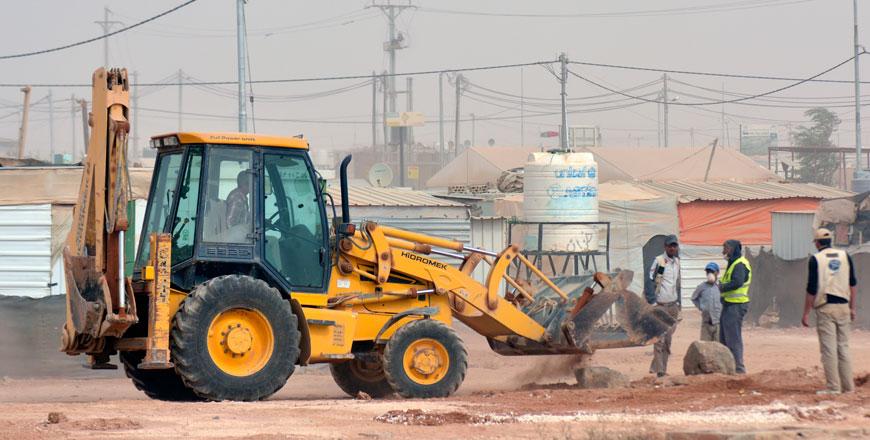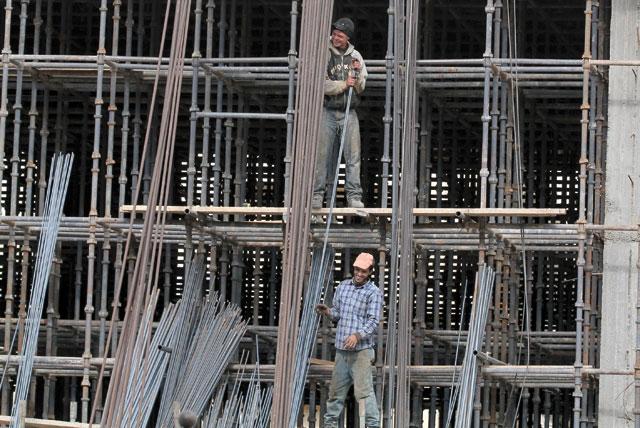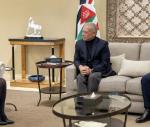You are here
Jordan issues more than 100,000 work permits for Syrians
By Ana V. Ibáñez Prieto - Jul 18,2018 - Last updated at Jul 18,2018

Syrian labourers are seen at Zaatari camp earlier this year. The majority of these workers are reluctant to join the formal labour market, officials have said (Photo by Amjad Ghsoun)
AMMAN — The Ministry of Labour has issued over 106,000 work permits for Syrian refugees so far while the number of workers in the informal economy remains at an estimated 300,000, head of the Syrian Refugees Department at the Ministry of Labour Hamdan Yacoub said on Saturday.
Yacoub warned that “the engagement of refugees with the informal economy is one of the most worrisome factors when gauging the impact of the refugee crisis on the Jordanian labour market”.
The remarks came during a seminar organised by Tamkeen Fields for Aid, which examined the impact of the presence of Syrian refugee workers on the available opportunities for Jordanian job seekers.
During the discussion, Yacoub noted that “there is a percentage of Syrian refugees who are reluctant to follow the procedures to obtain work permits”, explaining that “many of these individuals fear losing the financial support provided by international organisations or the possibility of resorting to a different country as a result of the issuance of a work permit and the regulation of their situation in Jordan”.
However, several stakeholders present at the seminar expressed their belief that the issuance of work permits does not affect the value of the assistance provided by humanitarian organisations, arguing that work permits are a regulatory procedure aimed at protecting the rights of these guest labourers in accordance with the provisions of the Labour Law.
“Our stand as the Ministry of Labour is to preserve the rights of Jordanian citizens to work while facilitating Syrian refugees’ access to the labour market in accordance with the Jordan Compact,” Yacoub told The Jordan Times in a recent interview, adding that “the Jordan Resilience Plan is the reference the ministry is considering when dealing with the crisis and formalising the refugees’ status in the labour market”.
The Jordan Compact, according to relevant literature, was signed by Jordan and the international community in February 2016 to deal with the Syrian refugee crisis, under which Jordan would receive support as it has assumed a heavy burden ensuing from hosting around 1.3 million Syrian refugees and is “carrying out a global public good on behalf of the international community”. Jordan pledged under the compact to facilitate Syrians’ access to the labour market in return for donors’ aid.
It was followed by a deal with the EU under which the union eased the rules of origin for Jordan under certain terms that officials are trying to modify due to their unfeasibility.
“We are aiming to encourage Syrian refugees to get involved into the industrial and manufacturing sectors and fulfill the requirements of the EU rules of origin,” the official said, adding that the ministry “is working hand in hand with the International Labour Organisation and UNHCR to raise awareness among the private sector on the need to do job matching and facilitate the refugees’ access to factory work”.
“Last year, we opened a list of jobs previously reserved for Jordanian citizens in order to encourage them [refugees] to join the formal labour market and formalise their status,” Yacoub said, adding that the ministry is now working on adapting the instructions for the issuance of work permits to facilitate the procedures for Syrian refugees.
For his part, Mohammad Maaytah, international expert on migrant workers and refugees at the Arab Trade Union Confederation, pointed out that “while regulating the labour market by granting work permits to refugees is part of the solution, the core of the issue lies in the lack of sufficient jobs for Jordanians, migrants and refugees alike”.
“The fundamental solution is to create equal-opportunity jobs in order to tackle the high unemployment rates,” he added, stressing that “this requires not only granting work permits, but easing the procedures, requirements and material costs”.
Related Articles
AMMAN — Over 16,000 flexible working permits for Syrian refugees employed in the construction sector have been issued over the past year, th
AMMAN — The NGO, Care International, on Sunday launched its “Work Permits Protect Your Rights” campaign, aimed at raising awareness among Sy
AZRAQ REFUGEE CAMP — The International Labour Organisation (ILO) and UNHCR on Sunday opened the first centre for employment at the Azr


















